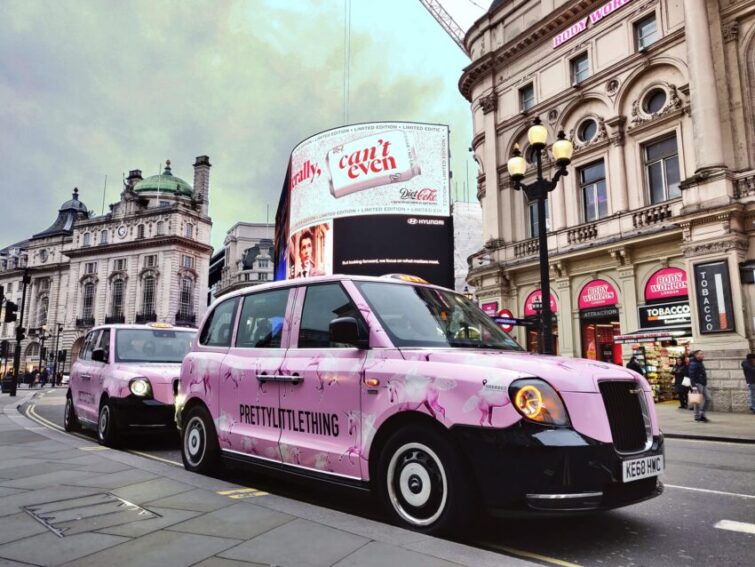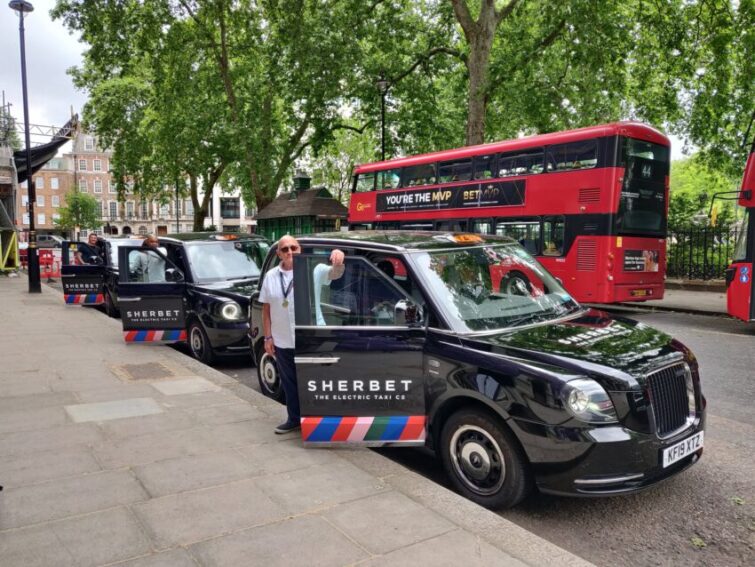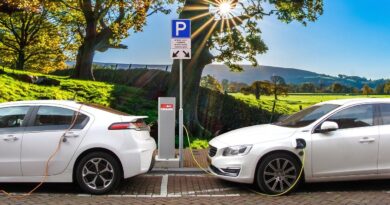
Green is the new black: Meet Asher Moses!
Meet Asher Moses, the founder of Sherbet London, who is on a mission to future-proof London’s iconic black cabs by turning them fully electric!
What is the story behind Sherbet?
It’s a truly humbling, inspirational story. I started off as a licenced London taxi driver. I did the knowledge of London and I gained my green badge in 1989. In those days, all taxis were black. There was a recession in 1990 and I had a light bulb moment. Things were tough, interest rates went up and I remember waiting for a pizza.
My wife and I were a bit short to buy that pizza, and the radio was on, and it was Victor Kiam saying “if you want to be successful, look at what you’ve got and maximise its opportunities.” I said “well, what have I got?” I only had a taxi. I was a night driver. Then I added a day driver onto it, and then I bought another taxi and another taxi.
Within 12 months, I had 120 diesel taxis on one road. In those days, taxis were black and I started putting advertising on the cabs. I grew my business and came up with many innovative ideas. Taxis needed credit card systems, so we came up with Taxi-Link; instant cash for credit card payers.
We elevated so much that we ended up buying TaxiMedia from Clear Channel and we sold it at the peak of the Olympics to Verifone, which was a NASDAQ company. They’re based on NASDAQ and they were a credit card provider, so they couldn’t penetrate London. They bought my company and we had to install 5000 credit cards in 5000 taxis.
After 18 months, Verifone bought me out and I went on garden leave and I came back in 2013 when Addison Lee sold out for £300 million to the Carlisle Group, I said, “well, if he could do it, I certainly can do it,” so I built the business with a view that one day we’ll grow into a unicorn. That was the vision.
We came up with a brand Sherbert. Why Sherbert? Because Sherbet Dab is cockney rhyming slang for cab, and we needed a brand that licenced cab drivers will link to and be proud of. Off we set with Sherbeck and started to buy Euro 6 taxis in line with Boris, our mayor’s strategy at the time. We quickly realised that the economy is going to go green very quickly and so I started to educate myself on electric.
Today, we’re at a stage where we’re future proofing London taxis. We’re disrupting the disruptors. We’re saying “Hey guys, you come in with just technology, but you need to operate. You need an operator. An operator is key to any technology partner.” What we’ve done, we’ve coupled the technology to our operations business, so we’re a tech operations business that can scale globally and future proof in London.

Having driven ICE vehicles all your life, did you have any concerns about the switch to electric taxis?
In life, you always have question marks. What will work, what won’t work, and you don’t really know. I saw the trend of people looking to save the planet. We knew that the ICE engine age was coming to an end, so we took a very bold move, which was an incredible move.
There was a whole mindset change that we had to adopt. We had to master the charging in London, meaning there wasn’t many charging points when I started, but we owned them, meaning no one could get on one of our charging points. We had to really deliver a change of mindset, a proper induction for taxi drivers. It actually takes an hour and a half to induct a driver from diesel to electric.
What have been some of the biggest challenges for you?
I think the word is parts. It’s more supply of parts. We’re having electric vehicle component issues, spare parts issues. There was a lot of charging issues as well, and it always is an issue. In my yard in Goldston, if I plug in ten taxis here, the guy from the corner shop comes running in with a hammer at me, telling me his lights are going off and he can’t open the till, so he really goes nuts. But that’s charging infrastructure. Once you commit to making that switch, you’ll find a strategy to come out of everything. It was challenging but we’re nimble, we can make decisions and get things done.
What have been some of the biggest milestones for the company?
From the risk of going green, the risk of investing in electric at the stage when I did, and then trying to scale up. Currently we’re at 500 electric taxis and still scaling. The milestones were trying to get our drivers to adopt this change mentally, because it wasn’t only an electric change, but if you think about the changes that actually hit London at the time you had technology disruptors coming in, how do you adapt to that change?
We’ve got loads of challenges being thrown at us every single day. Look at London’s 20 mile an hour network speed. Look at the low traffic neighbourhoods. All these things are massive challenges and mindsets for an established business who had freedom to go anywhere and everywhere in London. Now, you have to stop to charge, you can only drive 20 miles an hour, you can’t go into certain roads.
The milestone is mindset. How to get a traditional person, a diesel thinker, to say no. I’m telling them “You’re part of an evolution. You’re leading the challenge. You’re contributing to reducing emissions.”

Will London and other major cities ever become vehicle-free as the world moves towards a greener future?
I really doubt it’ll be vehicle free. When you go on holiday, you want to get a taxi driver to pick your bag out the car. You want to feel that little bit of white-glove service. This is what licenced London taxis are. It is the white-glove service of taxis. It’s not a private hire solution.
It’s part of helping London. It also contributes to London’s economy, just from the iconic value. So why should you take away iconic values? Will it be because we’re removing vehicles? I believe taxis will be there for a long time, with taxi drivers. There will be options for autonomous taxis and that is happening. I’ve been in an autonomous vehicle myself in Jerusalem and I felt that this really can happen.
It’s about taxi drivers to be thinking how can we adapt? How do we adapt to the challenge of autonomy? And how do we ensure that we can give the customer service as well? You go to a five-star hotel because you want the guy to open the door. You’re not going to take the doorman away.
You want that doorman picking up your bag, and that’s the same thing with London taxis. PHV, on the other hand, I don’t think they exist (in the future). I think it’ll be the other way.
How has business been for London taxis since the arrival of ride-sharing services like Uber and Lyft?
If we want to go back to 2013, licenced London taxis contributed at that stage £1.8 billion in licenced fares alone. Uber comes along and says “We’re going to take over the world” and disrupted the local marketplace. But who built Uber? The London taxi driver, because you would get in the back of a cab, not even knowing of Uber and the taxi driver would say, “Uber have killed us,” and you go “who?” and you download their app in the back of the cab. Taxi drivers didn’t realise the destruction globally they did to themselves.
The people would get in the back of the cab and they would just complain too much. When Uber disrupted us, our revenues probably hit to £900m. Today, we’re contributing probably 1.9, if not £2 billion to the London economy. People are willing to pay top money for a reliable, comfortable, clean green service. People used to say to me: “Uber have killed me.” I used to tell them that they don’t need another customer.
The guy in the back of your cab, you need to reclaim them. £1.4 billion last year, why are you complaining about Uber? Is that not enough between 19,000 drivers?
Do the maths. You can’t stop a cab these days because everybody’s fighting to get in them, and my cab drivers are earning real good money. The demand for taxis is there that there’s less cabs for the passengers, so obviously the taxi market is buoyant.
What’s next for Sherbet?
The bigger picture is to future proof licenced London taxis and to ensure that any city in the world who wants to replicate this tremendous taxi service can do it as a complete holistic programme for taxi drivers. My objective is to scale up substantially to bring in technology that allows drivers to work in shift patterns, so you don’t have to have a taxi all day. You can work in shifts. You can rent by the mile. Everything is about scale. Our objective is to scale and optimise our fleets using technology in order to reduce emissions in London and we’re going to be doing it very, very fast.






